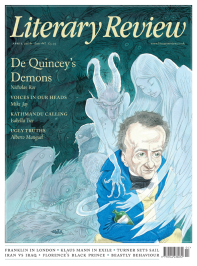Isabella Tree
Unhappy Valley
Kathmandu
By Thomas Bell
Haus 500pp £17.99
Since Nepal opened its borders to the outside world in 1951, Western travellers to the ancient Himalayan capital, Kathmandu, have chased notions of a long-lost Shangri-La. Even now, sixty-five years on, as environmental chaos, a rocketing population and galloping urban sprawl envelop the emerald valley in which the city lies, it is possible to choose your Kathmandu. You could focus on the exquisite palaces and pagoda-shaped temples (many of them UNESCO World Heritage Sites and already under reconstruction following the earthquakes of 2015), or on the colourful festivals and bazaars. Or you could head out into the hills for a blast of high-octane trekking through picturesque villages with panoramas of snow-capped mountains – the abode of the gods.
Thomas Bell’s Kathmandu is the antidote to this kind of escapism. With extraordinary candour and courage he blazes a trail through the backstreets of the city to the hidden places most of us choose not to see, listening to conversations we prefer not to hear when visiting a country as complicated as Nepal. Fault lines affecting the whole country radiate out from the city; to ignore them, this book makes clear, is to be complicit in the myths that continue to bind Nepal in a knot of poverty and injustice. It is not just tourists who can be selectively blind and deaf, but also expats, diplomats, aid agencies and a whole host of foreign NGOs.
The year 2016 marks the bicentenary of British-Nepalese relations, and a sorry affair much of that relationship has been. The arrival of the first British resident, a de facto spy, in Kathmandu early in the 19th century marked the beginning of a story of espionage, meddling and power-broking that culminated,

Sign Up to our newsletter
Receive free articles, highlights from the archive, news, details of prizes, and much more.@Lit_Review
Follow Literary Review on Twitter
Twitter Feed
It wasn’t until 1825 that Pepys’s diary became available for the first time. How it was eventually decrypted and published is a story of subterfuge and duplicity.
Kate Loveman tells the tale.
Kate Loveman - Publishing Pepys
Kate Loveman: Publishing Pepys
literaryreview.co.uk
Arthur Christopher Benson was a pillar of the Edwardian establishment. He was supremely well connected. As his newly published diaries reveal, he was also riotously indiscreet.
Piers Brendon compares Benson’s journals to others from the 20th century.
Piers Brendon - Land of Dopes & Tories
Piers Brendon: Land of Dopes & Tories - The Benson Diaries: Selections from the Diary of Arthur Christopher Benson by Eamon Duffy & Ronald Hyam (edd)
literaryreview.co.uk
Of the siblings Gwen and Augustus John, it is Augustus who has commanded most attention from collectors and connoisseurs.
Was he really the finer artist, asks Tanya Harrod, or is it time Gwen emerged from her brother’s shadow?
Tanya Harrod - Cut from the Same Canvas
Tanya Harrod: Cut from the Same Canvas - Artists, Siblings, Visionaries: The Lives and Loves of Gwen and Augustus John by Judith Mackrell
literaryreview.co.uk